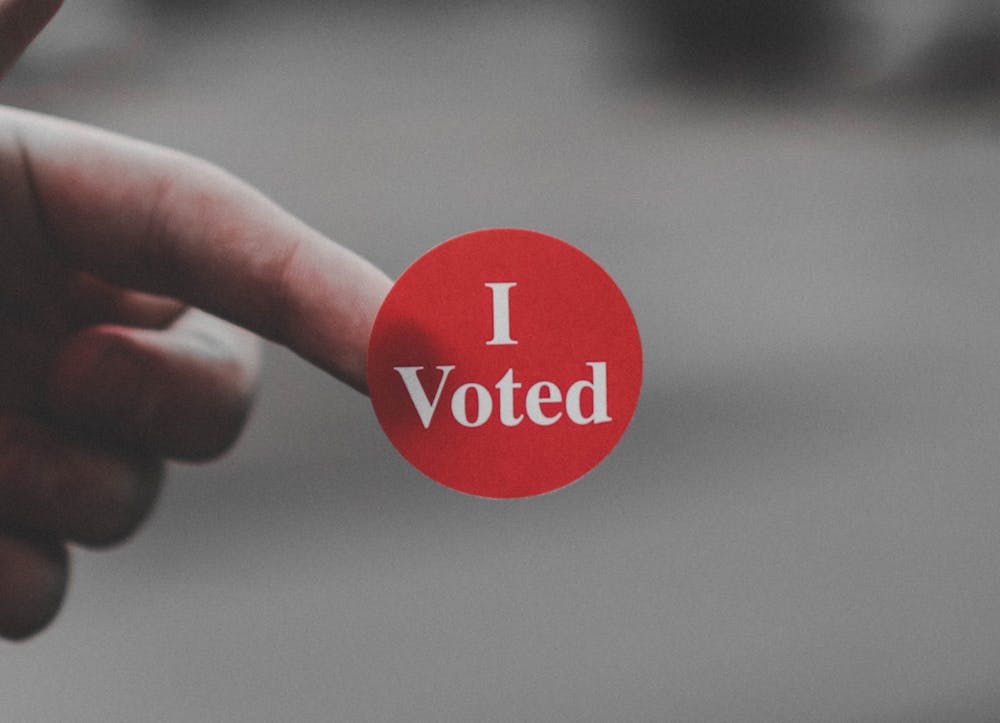
Katie Catterall is a sophomore journalism major and writes “In Between the Lines" for The Daily News. Her views do not necessarily reflect those of the newspaper.
As November steadily approaches, so does the 2020 presidential election. This year has been fraught with fear and uncertainty for the future. It has also highlighted some of the major racial issues still present in the United States. We have seen white supremacists come out of the woodwork, but we have also seen activists come out to fight against this racism. It is not the white supremacists themselves we should be focusing on, but the systemic racism present in our government — specifically felony disenfranchisement. While I have not experienced this racism personally, seeing people being unjustly punished is enough to make me resent our government. I recognize that I have privilege, and it’s people like me who need to speak up for those who can’t. I will be voting in the November election for the candidate that fights for these minorities.
In many states, those convicted of a felony have their right to vote revoked for life or face many roadblocks to get their constitutional right back, even after serving their time. This disproportionately affects people of color, who are incarcerated at higher rates than white people in the justice system. By stripping away felons’ right to vote, systemic racism is present because people of colors’ voices are silenced.Felony disenfranchisement has its own history with the creation of the 13th, 14th and 15th amendments. Birthright citizenship was established for freed and enslaved people, Black males were granted the right to vote and enslaved people were freed. However, slavery was still allowed as a punishment for a crime and was combined with “Black Codes.” Under these laws, African Americans were convicted and leased out to do work as punishment. This provided cheap labor to improve the South’s dwindling economy. By convicting them of crimes, taking away their right to vote, throwing them in prison and then leasing them out as labor, African Americans became stuck right back in the cycle of slavery. While things have seemingly improved, the current numbers still do not paint a good picture for minority criminal voting.
As it stands, there are only two states that allow people to vote while in prison: Vermont and Maine. For those residing in the additional 48 states, their right to vote is temporarily suspended, if not revoked. To add to the injustice, these people are still counted as a part of that district’s population. This allows for an electoral advantage for those districts — even though these people are not allowed an opportunity to have their voices heard.
A 2003 study published by The University of Chicago found that the higher the state’s African American population, the more likely the state was to enact strict laws that took away the right to vote from convicted criminals. Not only are these criminals more likely to be a minority group, but many of the convicted criminals are given plea deals offering them a reduced sentence for pleading guilty. This increases the likelihood of the innocent being convicted of a crime they did not commit just to avoid the full punishment they did not deserve, and they still get their constitutional right to vote taken away once out.

The obvious racial disparity has always been intertwined in the constitution and laws of the United States. This at its root is systemic racism because losing your voice in government affects every aspect of your life. Underrepresentation of people due to the shade of their skin will only fuel the flame of racial injustice.

The United States is among three other democracies whose use of revoking people’s birthright to vote seems to be an outlier in criminal punishment practices around the world. Countries like South Africa, Canada, Ireland and Spain all allow their prisoners to vote. Once in the system, it can be nearly impossible for felons to vote, with most states extending the voting ban to those on probation and parole. Some states even require more time and additional fees. Though systemic racism shown through minority voting underrepresentation has been intertwined with our constitution since the founding fathers’ signatures dried, minorities have recently gained the power to change history as people unify over racial injustice issues. There is hope for change still — as seen in Iowa recently. A recent executive order in the state, restored automatic voting rights to those who have served their time, and this includes parole and probation.

In late August, an executive order was issued by Republican Governor Kim Reynolds of Iowa that gave back those with a felony record the right to vote after completing their sentence, and it’s not just Iowa that is changing its tune. California, Florida, Kentucky, Louisiana, Nebraska, New Mexico, New York and Virginia have all expanded voting rights for those convicted of felonies since the 2016 election. Despite changes being made, there is still work to be done. There are still 34 states where people who are on parole or probation cannot vote as well as 12 states where a felony conviction revokes your right to vote for life. This is primarily affecting people of color. This underrepresentation affects every aspect of people of colors’ voices by revoking their voice in government. It may seem impossible to fight against this obvious systemic racism. However, there are things you can do to fight against this underrepresentation of people of color in government. Write to your legislators, and urge them to give those convicted of a felony the right to vote. Fight for your fellow human beings. That said, talking about the issue and acknowledging it is just one step in the fight for change — we have to do more. In order to annihilate bias and extinguish systemic racism and corruption, we need to vote. From local city to federal election, we need to vote in order to root out the officials who are allowing this systemic racism to continue. By electing officials that fight for everyone, only then can we begin to eliminate this blatant corruption — only then can we fight felony disenfranchisement laws and systemic racism. This isn’t just information to absorb, but a call to action. If you really want to fight for your fellow human beings, root out the people in office that are bringing them down in the first place. Put people in power that will change the system that is allowing this systemic racism to continue. Stand up in order to make change. Contact Katie Catterall with comments at khcatterall@bsu.edu.
Read More
‘We’re moving in the right direction’: Muncie Community Schools CEO talks about his first year with MCS
By Dr. Chuck Reynolds / 36 minutes agoDr. Chuck Reynolds talks about his first year with Muncie Community Schools and the school’s next five-year strategic plan.
Hot Friday gives way to weekend rain
By Jay Lesyk / 12 hours agoWeather Forecaster Jay Lesyk is tracking a hot Friday followed by a rainy weekend.
Ball Student Government Association (SGA) holds inauguration for new executive board
By Shelby Anderson / 13 hours agoSGA welcomed its new executive board for the next school year during its last meeting of the 2024-25 school year.





